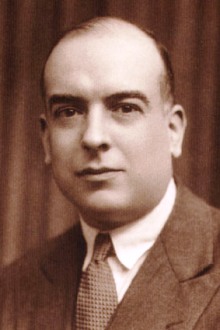Carlos Esplá facts for kids
Quick facts for kids
Carlos Esplá Rizo
|
|
|---|---|
 |
|
| Born | 23 June 1895 Alicante, Spain
|
| Died | 6 July 1971 (aged 76) Mexico
|
| Nationality | Spanish |
| Occupation | Journalist and politician |
Carlos Esplá Rizo (born June 23, 1895 – died July 6, 1971) was a Spanish journalist and politician. He was part of the Left Republican party. During the Spanish Civil War (1936–1939), he became Spain's first Minister of Propaganda for a few months.
Contents
Early Life and Journalism (1895–1931)
Carlos Esplá Rizo was born in Alicante, Spain, on June 23, 1895. His family was middle class and had liberal ideas. Carlos quickly became interested in politics. He helped start a Republican newspaper in Alicante called El Luchador (The Wrestler).
Because he wrote articles against the king, he had to leave Alicante. He moved to Valencia, where he met other important Republicans. He continued his work as a journalist there.
In 1921, Esplá went to Paris for a short trip. It turned into a seven-year stay! In Paris, he started a newspaper called España con Honra (Spain with Honor). He worked with famous Spanish writers like Miguel de Unamuno and Vicente Blasco Ibáñez. They all worked against the monarchy.
Esplá also wrote for many major newspapers in Spain. In 1929, he helped lead a movement against the government in Valencia. He traveled around Europe as a foreign correspondent for a newspaper called El Sol. In 1930, he became a vice-president of a group for journalists from around the world.
Political Work Before the War (1931–1936)
In March 1931, Esplá decided to return to Spain. He wanted to help with the new Second Spanish Republic. On April 14, 1931, he raised the new Republic's flag in Alicante. He was made the civil governor of the city.
However, he soon resigned and went to Madrid. He wanted to help the new government there. Esplá admired Manuel Azaña, a key leader. He believed he could best serve his country through journalism. He became the head of press relations for the Spanish Embassy in Paris.
Before going to Paris, he worked for a few weeks in the Ministry of State. He helped the new Minister, Alejandro Lerroux, with press matters. After this, he became the Civil Governor of Barcelona. He worked hard to make sure the Republic's changes happened smoothly. He also tried to control groups that he felt were a threat to democracy.
Esplá was elected to represent Alicante in the Spanish Parliament in June 1931. When Azaña became Prime Minister in October 1931, Esplá became a top official in the Interior Ministry. He worked well with leaders in Barcelona. He also helped create a special law for Catalonia in 1932, giving them more self-rule.
After the 1933 elections, where the Left lost, he left politics for a while. He started a Republican newspaper called Política. He felt the Left lost because they were not good at communicating with the press.
He was reelected to Parliament for Alicante in February 1936. When Azaña became President in May 1936, Esplá became his Under-Secretary. He was in this role when the military uprising began in July 1936. This event started the Spanish Civil War.
During the Spanish Civil War (1936–1939)
When the Spanish Civil War began in July 1936, workers' groups in Valencia called a general strike. They formed a committee to take control. To manage this, President Manuel Azaña created a special government council. This council was in charge of several provinces, including Valencia and Alicante. Carlos Esplá was part of this council.
On August 21, 1936, Prime Minister José Giral created a new office for propaganda and information. This office would manage all official news, radio, and cinema. Esplá was likely the one who suggested this idea. He was later made Secretary General of the Council of Ministers in September 1936.
In November 1936, as General Francisco Franco's troops got closer to Madrid, the government changed. Esplá became Spain's first Minister of Propaganda. He held this important job from November 1936 to May 1937. His subsecretary was the architect Manuel Sánchez Arcas.
When Juan Negrín became Prime Minister, he changed the Ministry of Propaganda. It became a smaller department under the Ministry of State. Esplá remained in charge of propaganda. A big part of his job was to share the Republic's message with foreign newspapers and the League of Nations. He worked as Sub-Secretary of State for Propaganda until April 1938.
Later Life (1939–1971)
After the Republic lost the war in April 1939, Esplá had to leave Spain. He was found guilty by the new government and sentenced to 30 years in prison. He found safety in Paris. There, he worked to help other Spanish people who had to leave their homes. He helped with groups like the Service for Evacuation of Spanish Refugees (SERE) and the Council of Aid to Spanish Republicans (JARE). He also wrote for a newspaper in Argentina.
In July 1940, he decided to move to Buenos Aires. In August 1940, he finally settled in Mexico. In Mexico, Esplá continued to help Spanish exiles. He managed funds for the Republic in exile. During World War II (1939–1945), he tried to unite the different Republican groups living outside Spain. However, he had some disagreements with others in the government in exile.
Later, he became a translator for the United Nations. He also became the President of the Spanish Republican Center in Mexico. He moved to Washington in July 1951 and spent time in New York. In 1956, he returned to Mexico. In his last years, Carlos Esplá stopped working due to health issues. He passed away in 1971.
See also
 In Spanish: Carlos Esplá para niños
In Spanish: Carlos Esplá para niños
 | Kyle Baker |
 | Joseph Yoakum |
 | Laura Wheeler Waring |
 | Henry Ossawa Tanner |

